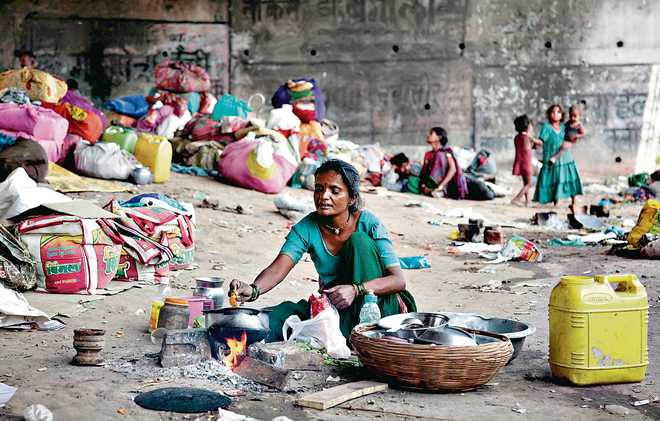
Other enemy: Poverty and under-development are hampering nation-building.
Bhartendu Kumar Singh
Indian Defence Accounts Service
AFTER the elections, strategic experts are shaping public opinion on national security issues along with agenda-setting. National security, we are told, is all about threats from Pakistan and China on the one hand and state-sponsored terrorism and Naxalism on the other. Concurrently, lack of defence modernisation and paucity of funds and weaponry are touted as constraints on national responses.
However, these established narratives do not really help in understanding the ‘national insecurities’ around us on a day-to-day basis since we fail to imagine and organise national security from a popular perspective.
India’s present national security discourse is a paradox of sorts. Throughout India’s strategic history, our strategic experts have put forward only a narrow and militarised version of national security. We only speak the language of more money, more weapons, more forces etc. The desire for popular security, best evident in phrase ‘roti, kapda aur makaan’ never firmly entered our vocabulary; forget equitable treatment in our op-ed articles and research publications. Also, our national security discourse is overtly focused on external enemies like China and Pakistan.
But what about the ‘other enemy’ called poverty and under-development that is hampering our nation-building process from within? Are we not supposed to treat them as security threats in equal measure? Do we realise that external and internal security threats are intrinsically linked and intellectual focus on internal threats can actually help in cost-effective management of external threats in long term?
True, there may not be a clear pecking order of our national insecurities or an agreed framework for evaluating and indexing them in our preference list. Perhaps that speaks why strategic experts keep meandering between China and Pakistan as numero uno national security threat. But if sheer number of casualties is taken as benchmark, it goes without saying that more people have lost life due to domestic insecurities than external insecurities.
In one single incident, more than 100 children lost their lives in Bihar’s Muzaffarpur district that can be linked to abysmal state of poverty. For years, we have been witnessing many deaths in the cancer belt of Malwa in Punjab. Everybody knows the generational loss due to drug menace in Punjab. We are just getting to hear that more than 20 cities in India would lose their groundwater by next year. We are now habituated to see photos of old women carrying water on their heads for kilometres in the perpetually drought-affected Maharashtra. These are just representative examples from the huge basket of domestic insecurities. And yet, it is the hyperbole of external threats that rule the roost!
There could be many factors in this partial treatment of national security.
First, we look at national security problems largely through Western Cold War literature and realist tools. We continue to treat state as primary referent of national security and ignore the ‘people’ who compose it. Taking advantage of low national security consciousness amongst the citizenry, we emotionalise the discourse focusing only on external enemies. In the process, we tend to ignore the issue of human dignity and desirability of facilitating ‘maximum happiness for maximum number’.
Second, the business of securitisation in India stands monopolised by a small group of strategic elites. These stalwarts are obsessed with visible or physical aspects of national security and turn a Nelson’s eye towards the ‘other’ aspects affecting people on a day-to-day basis. Proliferation of think-tanks and universities providing national security studies notwithstanding, the business of securitisation is yet to become a ‘mass culture’ in India allowing manipulation of knowledge-building and opinion-building by these elites.
Third, India misses out on many aspects of national security that are considered as sin qua non for great powers. We do not have a historically established environment of strategic culture, fiddling with offensive and defensive strategic policies for larger fulfillment of nation building objectives; though one can always question such arguments in the wake of numerous decisive strategic steps in past. We also do not have an official national security strategy to guide the hotch-potch and biased security discourse towards a balanced framework of defence and development.
We, therefore, need a comprehensive, progressive and humane national security discourse for swift identification of non-military national insecurities. For example, in 2018, India figures at 103 (out of 113 countries) on the Global Hunger Index; 130 (out of 155 countries) on the Human Development Index; and 136 (out of 163) in the Global Peace Index. These are just representative areas which show our backwardness in broader aspects of national security; not to mention that we also figure as one of the most dangerous nation for women (perhaps at number one position).
Similarly, there have been many studies on great power ranking, where except for defence expenditure and GDP, we are nowhere among the first 15 countries and perform rather miserably on various social-economic indices. With these poor national insecurity figures, we cannot dream of making an easy entry into the great power club.
Our phenomenal success in reducing open defecation and other aspects of the Gram Swaraj scheme proves that public policy can deliver in reducing those insecurities. But we need centrality of imagination and focused intellectual energies in strategising for these neglected aspects of security since great powers do not arise merely on military prowess but by augmenting comprehensive national power (CNP). Widening of national security discourse to cover neglected aspects of security can facilitate a cost-effective grand strategy to climb the stepping stones of CNP.
For long, we have been victims of unproductive and sometimes diversionary debates on the national security discourse. They did not make us secure in all aspects. Concurrently, many nations in our neighbourhood, hitherto poorer than us, have secured developed economic status along with better civic facilities. We can emulate them by re-imagining and re-constructing our national security discourse.
(Views are personal)



























